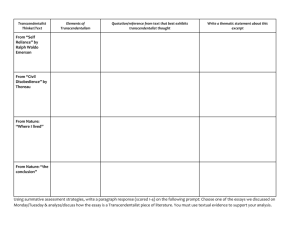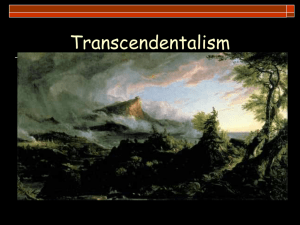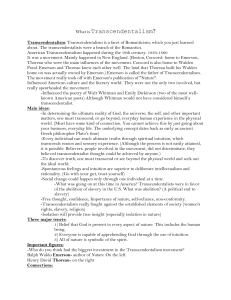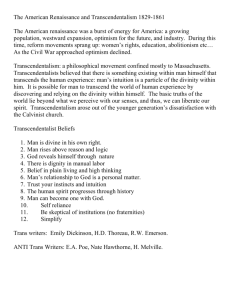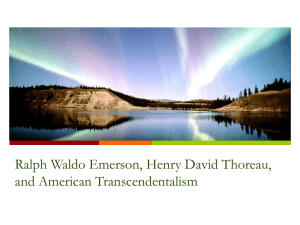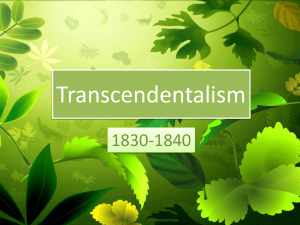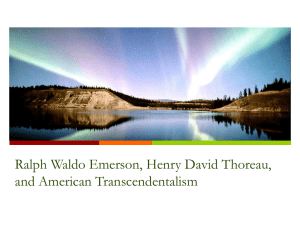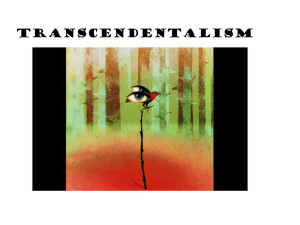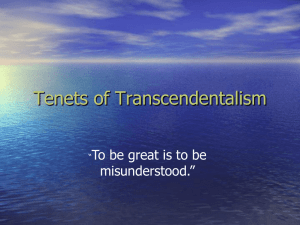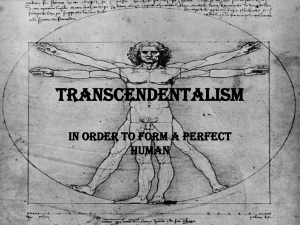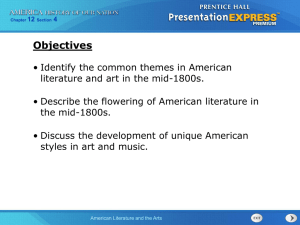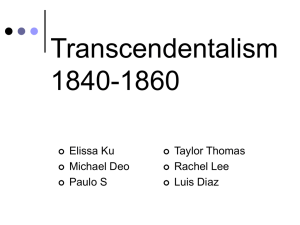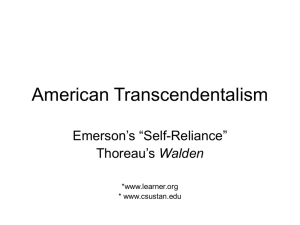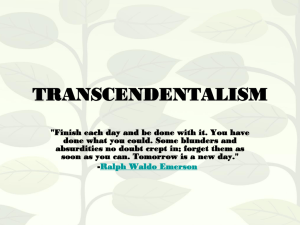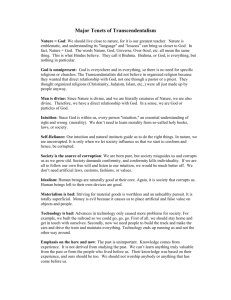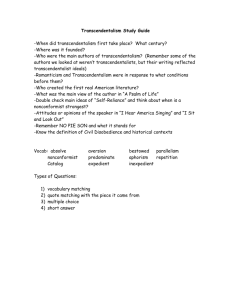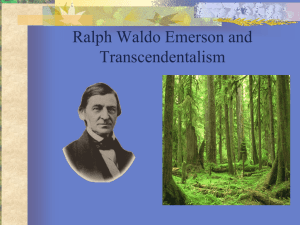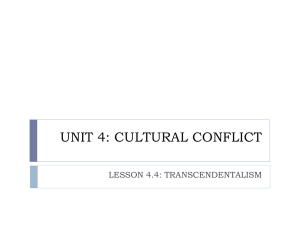Transcendentalism, Romanticism, and Dark Romanticism all come
advertisement
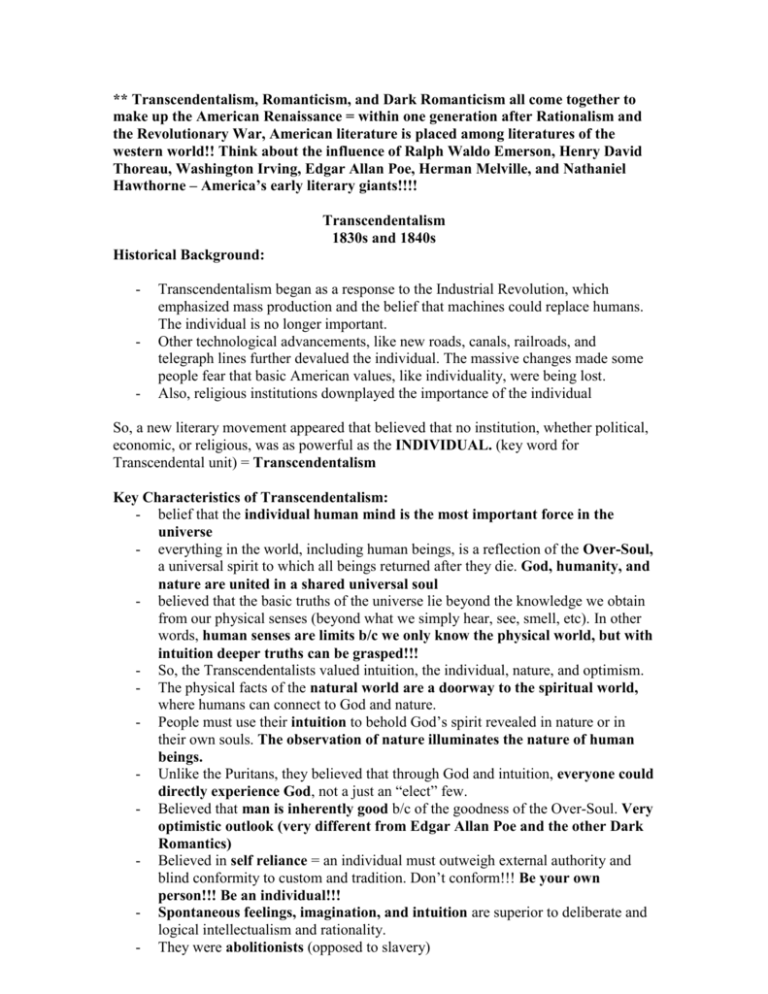
** Transcendentalism, Romanticism, and Dark Romanticism all come together to make up the American Renaissance = within one generation after Rationalism and the Revolutionary War, American literature is placed among literatures of the western world!! Think about the influence of Ralph Waldo Emerson, Henry David Thoreau, Washington Irving, Edgar Allan Poe, Herman Melville, and Nathaniel Hawthorne – America’s early literary giants!!!! Transcendentalism 1830s and 1840s Historical Background: - - - Transcendentalism began as a response to the Industrial Revolution, which emphasized mass production and the belief that machines could replace humans. The individual is no longer important. Other technological advancements, like new roads, canals, railroads, and telegraph lines further devalued the individual. The massive changes made some people fear that basic American values, like individuality, were being lost. Also, religious institutions downplayed the importance of the individual So, a new literary movement appeared that believed that no institution, whether political, economic, or religious, was as powerful as the INDIVIDUAL. (key word for Transcendental unit) = Transcendentalism Key Characteristics of Transcendentalism: - belief that the individual human mind is the most important force in the universe - everything in the world, including human beings, is a reflection of the Over-Soul, a universal spirit to which all beings returned after they die. God, humanity, and nature are united in a shared universal soul - believed that the basic truths of the universe lie beyond the knowledge we obtain from our physical senses (beyond what we simply hear, see, smell, etc). In other words, human senses are limits b/c we only know the physical world, but with intuition deeper truths can be grasped!!! - So, the Transcendentalists valued intuition, the individual, nature, and optimism. - The physical facts of the natural world are a doorway to the spiritual world, where humans can connect to God and nature. - People must use their intuition to behold God’s spirit revealed in nature or in their own souls. The observation of nature illuminates the nature of human beings. - Unlike the Puritans, they believed that through God and intuition, everyone could directly experience God, not a just an “elect” few. - Believed that man is inherently good b/c of the goodness of the Over-Soul. Very optimistic outlook (very different from Edgar Allan Poe and the other Dark Romantics) - Believed in self reliance = an individual must outweigh external authority and blind conformity to custom and tradition. Don’t conform!!! Be your own person!!! Be an individual!!! - Spontaneous feelings, imagination, and intuition are superior to deliberate and logical intellectualism and rationality. - They were abolitionists (opposed to slavery) Key Transcendentalist Groups and Places: 1) Transcendentalist Club - a group of intellectuals who gathered together regularly to discuss philosophy, religion, and literature. - Included Ralph Waldo Emerson, Henry David Thoreau, educator Bronson Alcott, feminist writer Margaret Fuller, and writer George Ripley - Worked together to create transcendentalist philosophy - Emerson’s essay “Nature” is their unofficial statement of belief. 2) - Brook Farm a utopian community located in Massachusetts Founded in 1841 by Transcendentalist Club Eventually went into debt and closed in 1847 3) - The Dial The country’s first literary journal/magazine Co-editors were Margaret Fuller and Ralph Waldo Emerson The journal was published four times a year; it only ran for four years. 4) Walden Pond - Henry David Thoreau’s retreat was a rough cottage in the woods at Walden Pond. - He wanted to put into action all of the Transcendental philosophies, so he left the city to live alone in a simple, bare house. - He disregarded material things and tried to live a simple life in harmony with nature. - He lived there for two years and wrote his famous collection of essays, Walden. Key Terms to Help YOU Understand Transcendentalism: 1) utopia – noun An ideally perfect place, especially in its social, political, and moral aspects. 2) Transcend – verb (1) To pass beyond the limits of: emotions that transcend understanding. (2) To be greater than, as in intensity or power; surpass: love that transcends infatuation. (3) To exist above and independent of (material experience or the universe): 3) Intuition – noun The act or faculty of knowing or sensing without the use of rational processes; immediate cognition; A sense of something not evident or deducible; an impression; a gut feeling
